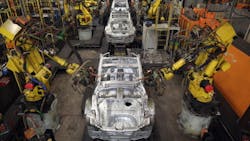Nissan Pledge in UK Offers Glimpse into Brexit Strategy
LONDON—Britain's promise to Nissan that the car industry will retain access to the European market has lifted some of the mystery shrouding the government's likely strategy in upcoming Brexit negotiations.
The Japanese manufacturer's announcement last week that it would continue to invest in its Sunderland plant was a coup for Prime Minister Theresa May, but immediately raised questions as to what assurances had been given for when Britain leaves the European Union.
Business Secretary Greg Clark later revealed the government had told Nissan that its objective in Brexit negotiations was "to ensure we have continued access to the markets in Europe and vice versa without tariffs and bureaucratic impediments".
"If you conduct the talks in a serious, constructive and civilized way, there is a lot in common we can establish," he told BBC television Sunday, highlighting the value of the British market to continental European carmakers.
The episode was seized upon by business leaders and politicians, who have been desperate for the government to clarify its strategy for negotiating with European leaders and Brussels.
Clark's comments raised suggestions that the government would pursue a branch-by-branch strategy, seeking access to the European market for individual sectors rather than retaining membership of the single market.
Staying in the single market means having to accept free movement of labor, a key objection of Brexit voters.
But May's spokeswoman denied that the Nissan developments showed the government was looking at different deals for different sectors, saying the overriding principle was "that we want to make sure businesses can continue to trade freely."
"It means that as we prepare for the negotiations it's right that we think about the interests of the fishing industry, and how the fishing quotas work, separately for how it works for the automotive industry," she added.
'Dead-weight loss'
The automobile sector is vital for Britain's economy, responsible for more than 800,000 jobs and 12 percent of total exports, although the country still imports more cars than it ships out.
But European leaders have warned against a sector-by-sector deal, with EU Council President Donald Tusk saying after the June referendum that "there can be no single market a la carte".
"The United Kingdom may favor a sector-by-sector approach during negotiations with the EU, but any free trade agreement must apply to the whole economy," said Hosuk Lee-Makiyama, economist and director of the European Centre for International Political Economy.
Other branches of the economy could demand the same commitments given to the automobile industry, while British employers' groups have lobbied to avoid a so-called "hard Brexit" and instead retain membership of the single market.
"Barriers to trade create a so-called dead-weight loss; in other words, it's simply not possible to compensate all the losers," Erik Nielsen, chief economist of Unicredit bank, warned in a recent note.
Pharmaceutical sector representatives have already confirmed a meeting with the government in November.
Downing Street has guaranteed the funding of specific research projects when the country leaves the EU, but the profession is demanding a long-term solution.
The government also needs to find a deal that will placate the country's powerful financial sector, which has repeatedly demanded guarantees that it will retain access to the single market, crucial for large banks based in the City of London.
"If Nissan (with 7,000 employees in Britain) can get a company specific commitment of support from the government, why not Citi group, which employs even more people in the UK?" asked Nielsen.
With the threat of compensation claims against the government if British manufacturers and service providers lose access to mainland Europe, the stakes could not be higher.
Copyright Agence France-Presse, 2016.
About the Author
Agence France-Presse
Copyright Agence France-Presse, 2002-2025. AFP text, photos, graphics and logos shall not be reproduced, published, broadcast, rewritten for broadcast or publication or redistributed directly or indirectly in any medium. AFP shall not be held liable for any delays, inaccuracies, errors or omissions in any AFP content, or for any actions taken in consequence.
